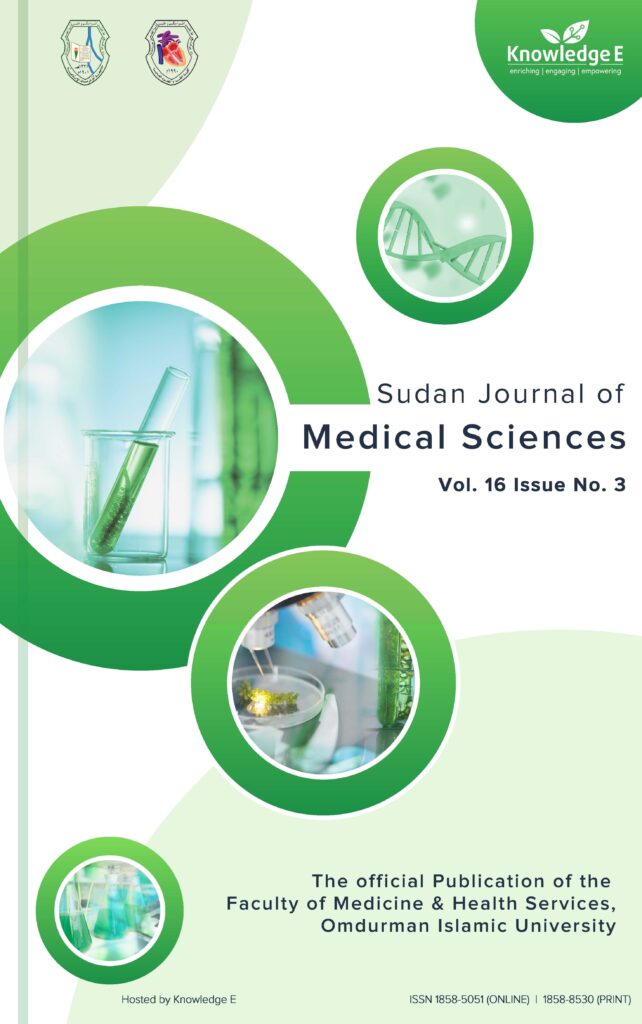
Sudan Journal of Medical Sciences
ISSN: 1858-5051
High-impact research on the latest developments in medicine and healthcare across MENA and Africa
Assessment of Self-medication Practices During COVID-19 Pandemic in Hyderabad and Karachi, Pakistan
Published date:Sep 30 2021
Journal Title: Sudan Journal of Medical Sciences
Issue title: Sudan JMS: Volume 16 (2021), Issue No. 3
Pages:347 – 354
Authors:
Abstract:
Background: Lack of appropriate treatment for COVID-19 infection led the general population of Pakistan toward self-medication and symptomatic treatment; almost 80% of the population collected medications for future use during pandemic. Thus, the current study aimed to assess the use of medication as symptomatic treatment preventive strategy.
Methods: This descriptive cross–sectional study was conducted on a local population of Hyderabad and Karachi, Sindh, Pakistan. The study duration was six months (April– September 2020). A total of 698 responders were selected via random sampling method. The number of participants were recruited based on 95% confidence interval with 5% margin error. Data were transferred into analysis sheet descriptively.
Results: Most participants responded to the use of different over-the-counter (OTC) products for headache. The use of antibiotics with prescription due to allergic conditions, cough, respiratory tract infections including sore throat, and urinary tract infections was also found among the majority. Few respondents had self-medication practice with sedatives due to difficulty in falling asleep, and 9.5% had self-medication practice due to pain. About 20.8% of the population agreed that lockdown was a contributing factor in the self-medication practice.
Conclusion: Pharmacists and healthcare professionals are advised to counsel the general public regarding the use of medication. A close collaboration is required at this stage to fight against COVID-19 and preventing the situation from worsening.
Keywords: self-medication, covid-19, Hyderabad, Karachi, Pakistan
References:
[1] Malik, M., Tahir, M. J., Jabbar, R., et al. (2020). Self-medication during Covid-19 pandemic: challenges and opportunities. Drugs & Therapy Perspectives, vol. 36, no. 12, pp. 565–567.
[2] Quispe-Cañari, J. F., Fidel-Rosales, E., Manrique, D., et al. (2021). Self-medication practices during the COVID-19 pandemic among the adult population in Peru: a cross-sectional survey. Saudi Pharmaceutical Journal, vol. 29, no. 1, pp. 1–11.
[3] Daniel, J. (2020). Education and the COVID-19 pandemic. Prospects, vol. 49, no. 1, pp. 91–96.
[4] Onchonga, D. (2020). A Google Trends study on the interest in self-medication during the 2019 novel coronavirus (COVID-19) disease pandemic. Saudi Pharmaceutical Journal: SPJ, vol. 28, no. 7, p. 903.
[5] Molento, M. B. (2020). COVID-19 and the rush for self-medication and self-dosing with ivermectin: a word of caution. One Health, vol. 10, 100148.
[6] Sadio, A. J., Gbeasor-Komlanvi, F. A., Konu, R. Y., et al. (2021). Assessment of selfmedication practices in the context of the COVID-19 outbreak in Togo. BMC Public Health, vol. 21, no. 1, pp. 1–9.
[7] Sahanic, S., Boehm, A., Pizzini, A., et al. (2020). Assessing self-medication for obstructive airway disease during COVID-19 using Google Trends. European Respiratory Journal, vol. 56, no. 5, 2002851.
[8] Watkins, J. (2020). Preventing a covid-19 pandemic. BMJ, vol. 368, m810.
[9] Nicola, M., Alsafi, Z., Sohrabi, C., et al. (2020). The socio-economic implications of the coronavirus and COVID-19 pandemic: a review. International Journal of Surgery, vol. 78, pp. 185–193.
[10] Van Bavel, J. J., Baicker, K., Boggio, P. S., et al. (2020). Using social and behavioural science to support COVID-19 pandemic response. Nature human behaviour, 4(5), 460-471.
[11] Omer, S. B., Malani, P., and Del Rio, C. (2020). The COVID-19 pandemic in the US: a clinical update. JAMA, vol. 323, no. 18, pp. 1767–1768.
[12] Karbownik, M. S., Dobielska, M., Paul, E., et al. (2020). Health-, medication-and dietary supplement-related behaviors and beliefs relatively unchanged during the COVID-19 pandemic lockdown. Research in Social and Administrative Pharmacy.
[13] Ruiz, M. E. (2010). Risks of self-medication practices. Current Drug Safety, vol. 5, no. 4, pp. 315–323.
[14] Figueiras, A., Caamano, F., and Gestal-Otero, J. J. (2000). Sociodemographic factors related to self-medication in Spain. European Journal of Epidemiology, vol. 16, no. 1, pp. 19–26.
[15] Awad, A., Eltayeb, I., Matowe, L., et al. (2005). Self-medication with antibiotics and antimalarials in the community of Khartoum State, Sudan. Journal of Pharmacy and Pharmaceutical Sciences, vol. 8, no. 2, pp. 326–331.
[16] Afolabi, A. O. (2008). Factors influencing the pattern of self-medication in an adult Nigerian population. Annals of African medicine, vol. 7, no. 3, pp. 120–127.
[17] Mainous, A. G., Diaz, V. A., & Carnemolla, M. (2008). Factors affecting Latino adults’ use of antibiotics for self-medication. The Journal of the American Board of Family Medicine, vol. 21, no. 2, pp. 128–134.
[18] Selvaraj, K., Kumar, S. G., and Ramalingam, A. (2014). Prevalence of self-medication practices and its associated factors in Urban Puducherry, India. Perspectives in Clinical Research, vol. 5, no. 1, p. 32.
[19] Abasaeed, A., Vlcek, J., Abuelkhair, M., et al. (2009). Self-medication with antibiotics by the community of Abu Dhabi Emirate, United Arab Emirates. The Journal of Infection in Developing Countries, vol. 3, no. 7, pp. 491–497.
[20] Karimy, M., Rezaee-Momtaz, M., Tavousi, M., et al. (2019). Risk factors associated with self-medication among women in Iran. BMC Public Health, vol. 19, no. 1, pp. 1–7.
[21] Lukovic, J. A., Miletic, V., Pekmezovic, T., et al. (2014). Self-medication practices and risk factors for self-medication among medical students in Belgrade, Serbia. PloS ONE, vol. 9, no. 12, e114644.
[22] Mansuri, F. M., Zalat, M. M., Khan, A. A., et al. (2020). Estimating the public response to mitigation measures and self-perceived behaviours towards the COVID- 19 pandemic. Journal of Taibah University Medical Sciences, vol. 15, no. 4, pp. 278– 283.